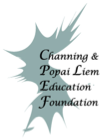Alliance of Scholars Concerned about Korea (ASCK)
Representing scholars working in the United States and in other countries, the Alliance of Scholars Concerned about Korea was founded, according to its mission statement, on the belief that “current problems on the Korean peninsula and between the US and the two Koreas, the Democratic People’s Republic of Korea and the Republic of Korea, can only be solved through dialogue, cooperation, and the active pursuit of peace.” From 2010-2013, in conjunction with the National Campaign to End the Korean War, ASCK launched a three-year Teaching Initiative to End the Korean War. Nearly all the scholarly articles on this website represent contributions from ASCK participants in that initiative. The Legacies project also worked with ASCK professors to integrate an oral-history segment into their curriculum, offered oral-history training, and provided follow-up support.
 Channing and Popai Liem Education Foundation
Channing and Popai Liem Education Foundation
The Channing and Popai Liem Education Foundation seeks to promote and to carry out educational activities about U.S.-Korea relations and Korean American history and culture. Its work includes the creation of a multimedia exhibit embodying memories of the Korean War, “Still Present Pasts: Korean Americans and the ‘Forgotten War’” (see Resources) and the “Korean American Memories of the Korean War” oral-history project. Some of the oral histories from the “Korean American Memories of the Korean War” oral-history project are included in this website’s Story Archive.
Korea Policy Institute
The Korea Policy Institute (KPI) is a California-based non-profit independent research and educational institute that provides timely analysis of U.S. policies toward Korea as well as developments on the Korean peninsula and within the diaspora. Although policy institutes often work in isolation from communities and broader social movements, KPI was founded as a committed partnership among grassroots Korean American community advocates, policy professionals, and academics. In its composition and in the connections it maintains to community organizations, KPI situates itself within a broad-based movement for peace and social justice. KPI maintains a website with interviews, articles, and resource links on Korea-US issues, and publishes an e-newsletter. Its past collaborations include numerous successful multi-media events over the years, including the 2013 “Ending the Korean War” conference at UCLA, the 2011 “Unending Korean War”” conference at NYU, the 2010 DMZ to DC” event in Washington, DC, the “Korea Reunification” conference in 2008 at UC Berkeley, and numerous public forums in New York, the Bay Area, and Los Angeles.
Missing Pieces Project
 Initiated by second-generation Korean American high school students in the Los Angeles area as part of an annual K. W. Lee Center for Leadership training program, the Missing Pieces Project, according to its own mission statement, “ strives to raise awareness of the imminent issue of divided families in the Korean American community” through a multi-media platform that includes “collective memoirs and informative documentaries.” In addition, this youth-driven project seeks to educate the U.S. government about the urgency of reuniting divided families.
Initiated by second-generation Korean American high school students in the Los Angeles area as part of an annual K. W. Lee Center for Leadership training program, the Missing Pieces Project, according to its own mission statement, “ strives to raise awareness of the imminent issue of divided families in the Korean American community” through a multi-media platform that includes “collective memoirs and informative documentaries.” In addition, this youth-driven project seeks to educate the U.S. government about the urgency of reuniting divided families.
Mu Films
 Mu Films is a non-profit documentary production company based in Berkeley, California. The mission of Mu Films is to produce and distribute documentaries and educational media about social, political and cultural issues with a focus on untold stories
Mu Films is a non-profit documentary production company based in Berkeley, California. The mission of Mu Films is to produce and distribute documentaries and educational media about social, political and cultural issues with a focus on untold stories
Still Present Pasts
 “Still Present Pasts: Korean Americans and the ‘Forgotten War’” is a landmark multi-media exhibit of installation and performance art, documentary film and archival photographs, and oral histories that explores memories and legacies of the Korean War. Embodying life stories of ordinary Korean Americans who experienced the war, the exhibit is a public space of remembering that breaks the silence about a tragic episode in U.S. and Korean history.
“Still Present Pasts: Korean Americans and the ‘Forgotten War’” is a landmark multi-media exhibit of installation and performance art, documentary film and archival photographs, and oral histories that explores memories and legacies of the Korean War. Embodying life stories of ordinary Korean Americans who experienced the war, the exhibit is a public space of remembering that breaks the silence about a tragic episode in U.S. and Korean history.

